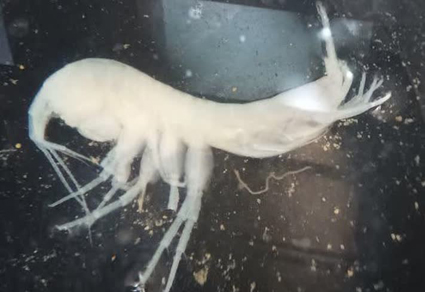Abstract
Niphargus species are a significant proportion of freshwater amphipods found in the groundwaters of the Western Palearctic, comprising about a quarter of all known species. Recently, a new species, N. qazvinensis, was discovered in the Samaq Abad Spring located in Qazvin Province, Iran. The identification of this new species was supported by morphological features as well as the analyses of mitochondrial (COI) and nuclear (28S rDNA) gene sequences. Genetic analysis revealed that N. qazvinensis sp. nov. is most closely related to N. urmiensis, N. hakani, and N. fiseri. Notably, N. qazvinensis can be distinguished from other known Niphargus species based on distinct morphological features. These include the presence of two and one robust setae on the postero-dorsal margin of urosomites II and III, respectively. Additionally, the gnathopods I to II propodi are characterized by three and two robust setae with lateral projections on the outer surface in the palmar corner, respectively. Furthermore, maxilla I bears between none to two lateral projections on outer plate robust setae.
References
- Astrin, J.J. & Stüben, P.E. (2008) Phylogeny in cryptic weevils: molecules, morphology and new genera of Western Palaearctic Cryptorhynchinae (Coleoptera: Curculionidae). Invertebrate Systematics, 22 (5), 503–522. https://doi.org/10.1071/IS07057
- Bargrizaneh, Z., Fišer, C. & Esmaeili-Rineh, S. (2021) Groundwater amphipods of the genus Niphargus Schiødte, 1834 in Boyer-Ahmad region (Iran) with description of two new species. Zoosystema, 43 (7), 127–144. https://doi.org/10.5252/zoosystema2021v43a7
- Borko, S., Trontelj, P., Seehausen, P.O., Moškrič, A. & Fišer, C. (2021) A subterranean adaptive radiation of amphipods in Europe. Nature Communications, 12, 3688. https://doi.org/10.1038/s41467-021-24023-w
- Bousfield, E.L. (1977) A new look at the systematics of gammaridean amphipods of the world. Crustaceana Supplement, 4, 282–316. https://doi.org/10.1038/s41467-021-24023-w
- Esmaeili-Rineh, S., Sari, A., Delić, T., Moškrič, A. & Fišer, C. (2015) Molecular Phylogeny of the Subterranean Genus Niphargus (Crustacea: Amphipoda) in the Middle East: A Comparison with European Niphargids. Zoological Journal of the Linnaean Society, 175, 812–826. https://doi.org/10.1111/zoj.12296
- Esmaeili-Rineh, S., Mirghaffari, S.A. & Sharifi, M. (2017) The description of a new species of Niphargus from Iran based on morphological and molecular data. Subterranean Biology, 22, 43–58. https://doi.org/10.3897/subtbiol.22.11286
- Esmaeili-Rineh, S., Mamaghani-Shishvan, M., Fišer, C., Akmali, V. & Najafi, N. (2020) Range sizes of groundwater amphipods (Crustacea) are not smaller than range sizes of surface amphipods: a case study from Iran. Contributions to Zoology, 79, 1–13. https://doi.org/10.1163/18759866-20191418
- Esmaeili-Rineh, S. & Mirghaffari, S.A. (2021) Niphargus hegmatanensis sp. nov. (Crustacea: Amphipoda: Niphargidae), a new species from subterranean freshwaters of western Iran. Iranian Journal of Fisheries Sciences, 20, 1049–1063.
- Hall, T.A. (1999) BioEdit: a user-friendly biological sequence alignment editor and analysis program for Windows 95/98/NT. Nucleic acids symposium series, 41, 95–98.
- Kalyaanamoorthy, S., Minh, B.Q., Wong, T.K.F., Haeseler, A. & Jermiin, L.S. (2017) Model Finder: Fast model selection for accurate phylogenetic estimates. Nature Methods, 14, 587–589. https://doi.org/10.1038/nmeth.4285
- Kashani, G.M., Malekhosseini, M. & Sadeghi, S. (2013) First recorded cave-dwelling terrestrial isopods (Isopoda: Oniscidea) in Iran with a description of a new species. Zootaxa, 3734 (5), 591–596. https://doi.org/10.11646/zootaxa.3734.5.8
- Kimura, M. (1980) A simple method for estimating evolutionary rate of base substitutions through comparative studies of nucleotide sequences. Journal of Molecular Evolution, 16, 111–120. https://doi.org/10.1007/BF01731581
- Koch, C.L. (1836) Deutschlands Crustaceen, Myriapoden und Arachniden. Ein Beitrag Zur Deutschen Fauna. Herausgegeben von Dr. Herrich-Schäfer, Regensburg, 5, 1–24.
- Kumar, S., Stecher, G., Li, M., Knyaz, C. & Tamura, K. (2018) MEGA X: Molecular Evolutionary Genetics Analysis across computing platforms. Molecular Biology and Evolution, 35, 1547–1549. https://doi.org/10.1093/molbev/msy096
- Latreille, P.A. (1802) Histoire naturelle générale et particulière des Crustacés et des Insectes. Tome 3. Familles naturelles des genres. Vol. 3. F. Dufart, Paris, 467 pp. https://doi.org/10.5962/bhl.title.15764
- Latreille, P.A. (1816) Amphipoda. Nouveau Dictionaire 431 d’histoire naturelle, appliquée aux Arts, à l’Agriculture, à l’Économie rurale et domestique, à la Médecine, etc. Par une société de Naturalistes et d’Agriculteurs, 2nd Edition, 1, 467–469.
- Lowry, J.K. & Myers, A.A. (2013) A phylogeny and Classification of the Senticaudata subord. nov. (Crustacea: Amphipoda). Zootaxa, 3610 (1), 1–80. https://doi.org/10.11646/zootaxa.3610.1.1
- Mamaghani-Shishvan, M. & Esmaeili-Rineh, S. (2019) A two new species of groundwater amphipods of the genus Niphargus Schiodte (Crustacea, Amphipoda, Niphargidae) from the northwestern Iran. European Journal of Taxonomy, 546, 1–23. https://doi.org/10.5852/ejt.2019.546
- Minh, B.Q., Nguyen, M.A.T. & Haeseler, A. (2013) Ultrafast approximation for phylogenetic bootstrap. Molecular Biology and Evolution, 30, 1188–1195. https://doi.org/10.1093/molbev/mst024
- Müller, F. (1846) Ueber Gammarus ambulans, neue Art. Archiv für Naturgeschichte, 12, 296–300.
- Posada, D. (2008) jModelTest: Phylogenetic model averaging. Molecular Biology and Evolution, 25, 1253–1256. https://doi.org/10.1093/molbev/msn083
- Rambaut, A. & Drummond, A.J. (2009) Bayesian Evolutionary Analysis Sampling Trees (BEAST). Version 1.7.4. University of California, Los Angeles, California. [program]
- Ronquist, F. & Huelsenbeck, J.P. (2003) MrBayes 3: Bayesian phylogenetic inference under mixed models. Bioinformatics, 19, 1572–1574. https://doi.org/10.1093/bioinformatics/btg180
- Sars, G.O. (1894) Crustacea Caspia: Contributions to the knowledge of the carcinological fauna of the Caspian Sea. Part III. Amphipoda. Supplement. Bulletin de l’Académie Impériale des Sciences de Saint Pétersbourg, 179–242. https://doi.org/10.5962/bhl.title.10631
- Schiödte, J.G. (1849) Bidrag til den underjordiske fauna: Det kong danske vidensk Selsk skrifter Femte Raekke Naturv Mathem Afd Andet Bind. Copenhagen, 2, 39.
- Thompson, J.D., Higgins, D.G. & Gibson, T. (1994) Clustal W: improving the sensitivity of progressive multiple sequence alignment through sequence weighting, position specific gap penalties and weight matrix choice. Nucleic Acids Research, 22, 4673–4680. https://doi.org/10.1093/nar/22.22.4673
- Verovnik, R., Sket, B. & Trontelj, P. (2005) The colonization of Europe by the freshwater crustacean Asellus aquaticus (Crustacea: Isopoda) proceeded from ancient refugia and was directed by habitat connectivity. Molecular Ecology, 14, 4355–4369. https://doi.org/10.1111/j.1365-294X.2005.02745.x
- Zakšek, V., Sket, B. & Trontelj, P. (2007) Phylogeny of the cave shrimp Troglocaris: evidence of a young connection between Balkans and Caucasus. Molecular Phylogenetics and Evolution, 42, 223–235. https://doi.org/10.1016/j.ympev.2006.07.009


